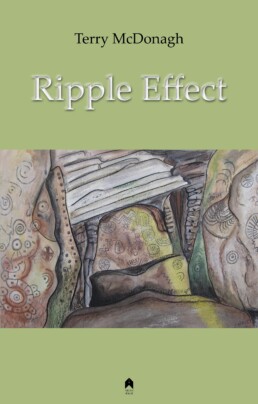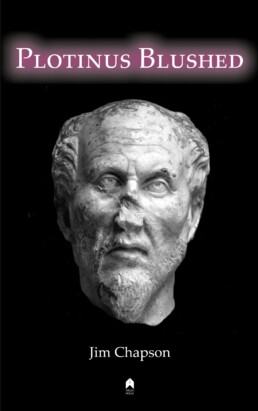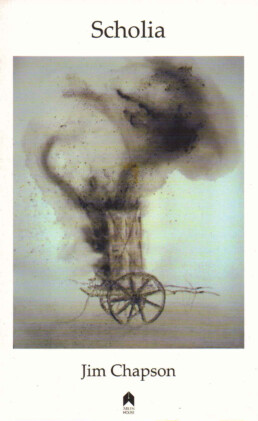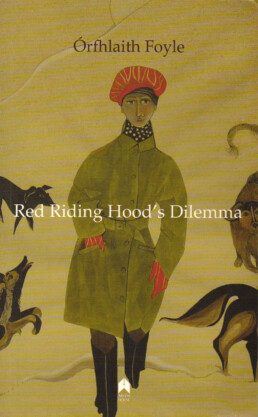Tattoo / Tatú
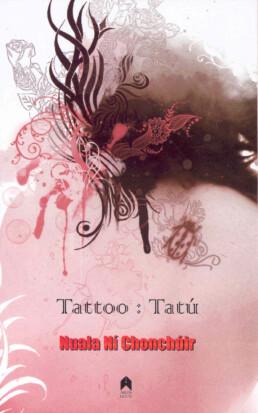
Nuala Ní Chonchúir
Tattoo / Tatú
ISBN: 9781903631607
Available from
In this bilingual collection, Tattoo : Tatú, the hidden stories of both famous and ordinary women are teased out in crafted, often wry, poems: Virginia Woolf’s dying moments in ‘Virginia’s Last Walk’, a woman’s arranged marriage in ‘Cleamhnas 1933’. Nuala Ní Chonchúir works on the economy of language and, in her poetry, tone and sense meld seamlessly with her incisive, fresh word choices. There is a deepened focus and more mature concerns: sensual love and its ability to save (‘And Then’); the longevity of grief (‘Corcracht/Purpling’); the arresting power of visual art (‘Bonjour, Monsieur Gauguin’).
Swimming With Pelicans
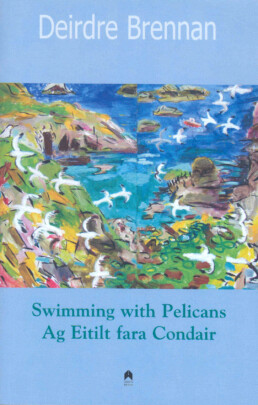
Deirdre Brennan
Swimming With Pelicans / Ag Eitilt fara Condair
ISBN: 9781903631645
In this dual language collection there are evocations of memory, poems of war, dispossession and the removal of freedom. Landscapes hold a sense of threat and foreboding, hiding the missing, the murdered, the unbaptised. Dream landscapes feature as background to the hunt for imagination and inspiration. Old deities, Celtic, Hindu or Mayan break through consciousness to claim their dues, and old languages whisper just beyond the range of hearing. Life’s transience – birth, ageing and death, including the death of children and the demolition of the old to make way for the new – is addressed in stunning sequences.
Ripple Effect
In this new collection, Terry McDonagh is back shaping his real and imaginative journeys round Cill Aodain, Hamburg, Melbourne or Slough. Always the artful storyteller, his language continues to bounce randomly and ordered like the memory of flat stones he used to cast out on the river. When a stone fell splash, it sent big or smaller ripples like voices across timeless water where you could never measure the distance between the concentric circles or the effect that one stone had on the life of water. The poet was sad when a tiny pebble, he’d taken from Raftery’s grave in Killeeneen, fell into a gully in Melbourne. Later I was satisfied – I had passed it on. The ripple effect resonated near Flinder’s Street Station. He’s in a Doll’s House in some city or other, and in the Small Townville of his teenage years in County Mayo. He returns again and again to Cill Aodain – a place he never quite left but could never have stayed in, either. There is script upon script on streets with strange names and habits, or again, a story fell ping into my lap as birds continued singing for me and for people I didn’t grow up with. But these streets and people are the true, dislocated home of Terry McDonagh. His lyrical moments lie about like spiritual observations. You just knew there was a god of a kind, or elsewhere, the dead were never far from us as children.
Terry McDonagh’s poems begin in places we can all recognise, but take us into uncharted territories with tall tales that are funny, unsettling, and wise. There are hints of wistfulness in these poems, of getting older and looking back, but he is confident that we do the right thing in the end, and like Raftery’s pebble that he loses in Melbourne, he may no longer hold it but is happy that he has passed it on. These are poems we can immerse ourselves in, and will emerge richer from the experience.
– Andrew Forster,
poet and Literature Officer at the Wordsworth Trust, Grasmere
Exile and dislocation are familiar themes in Irish literature and Terry McDonagh explores these to the full. His poetic self continually reflects on journeying and he crafts images to make sense of it all. Memory, alienation and longing are leitmotifs within him.
– Carol O’Connor,
Tintean, Melbourne
Plotinus Blushed
Jim Chapson published his first book-length collection of poetry when he was sixty-five. Daphnis and Ratboy (Arlen House, 2009), brought to the attention of a wider public the heady abundance of this truly audacious talent. In his poems he is a deeply cultured sensualist who communes effortlessly between a lofty pan-Hellenic past and a more offbeat latter-day Milwaukee. Attuned to the ancient, but alert to the present, he, like Cavafy, is a poet of time and desire. These new poems, ironically rueful, tender and laconically subtle, show the full range and resonance of Chapson’s masterful handling of the modern lyric.
– Cathal Ó Searcaigh
A Talk with the Heart
He was lying in bed waiting for sleep
to bring its possibilities
when his heart banged out a number
of irregular rhythms, demanding attention
like a drummer taking his solo.
Time for a talk with the heart, he thought.
He thanked it for being the steady one
in the relationship, apologized
for being so dependent, let it know
its long service was not unappreciated.
His heart replied it wasn’t asking
for recognition, that if he thought its toil
was on his behalf, he was mistaken;
it had its own agenda. The heart breaks,
heart throbs, heart felt desires, were all his doing.
In its heart of hearts it desired stillness.
He said to his heart, ‘I understand’,
but he didn’t. He said, ‘I’m sorry’,
but he wasn’t. He said, ‘from now on …’,
but didn’t know what came after that.
Scholia
Stillness. The bruised reed not breaking.
Dust on the road.
Justice. The sun rising, sweeping across the sky.
Darkness falling. Stars.
Who can bear this?
− from Justice
Jim Chapson, born in Honolulu, Hawaii, in 1944, was educated at San Francisco State University, and now teaches satire and other forms of writing at the University of Wisconsin-Milwaukee. He has been a regular visitor to Ireland for over forty years and has an active involvement in the Irish literary scene. His first book-length collection, Daphnis & Ratboy, was published by Arlen House in 2008.
‘From start to finish he presents a stunning body of work that deftly moves between razor sharp satire and passionate spiritual concern’
− Paul Vogel, An Sionnach
‘His first full collection is an accomplished work. He is a versatile poet who is able to express a variety of feelings, to use irony, paradox and humour, to deal with contemporary settings and draw upon classical sources’
− Maurice Harmon, The Irish Times
Fest City
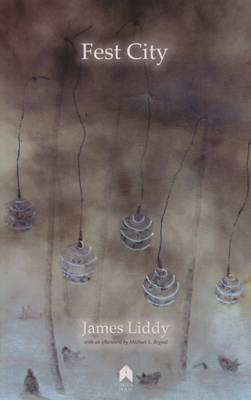
James Liddy
Fest City
with an afterword
by Michael S. Begnal
ISBN: 9780905223957
Bring me my banjo of paper talent to play suits of
travel songs to mother memory and to a beloved
down in the town. Dance the set. The kings enter
the stage’s opposite doors.
− from Two Dreams
James Liddy was born in Dublin in 1934, of parents who hailed from Limerick and New York. He published many books over a fifty-year career including Wexford and Arcady (Arlen House, 2008), The Askeaton Sequence (Arlen House, 2008) and The Full Shilling (Salmon, 2009). He was a Professor in the English Department at the University of Wisconsin-Milwaukee for many years, where he taught creative writing and Irish and Beat literature. James Liddy: A Critical Study by Brian Arkins was published by Arlen House in 2001 and the widely acclaimed Honeysuckle, Honeyjuice: A Tribute to James Liddy, edited by Michael S. Begnal, appeared in 2006. He passed away on 5 November 2008 following a short illness, leaving behind a number of completed manuscripts.
‘Liddy’s work is guided by a fierce and an independent intelligence and by an unwavering faith in the importance of poetry’
− Eamonn Wall, The Irish Times
‘James Liddy was one of the most independent, engaging, and original poets of his time. His poetry … revealed a consistent intellectual and emotional curiosity’
− Mary Cloake, Director, Arts Council of Ireland
Eva Gore-Booth: Collected Poems
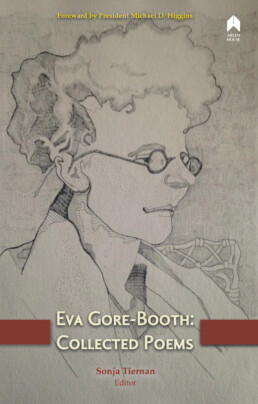
Eva Gore-Booth
Eva Gore-Booth: Collected Poems
Sonja Tiernan (ed)
Foreword by Michael D Higgins, President of Ireland
ISBN: 9781851321698
Eva Gore-Booth was born in 1870 at Lissadell House in County Sligo. Eva’s parents were conscientious landlords and when a second wave of famine swept across the area, during the winter of 1879–80, they opened their food store for any tenant in need. This sense of responsibility for others less fortunate was to have an impact on the Gore-Booth children. In 1897 Eva rejected her aristocratic lifestyle and moved to the industrial city of Manchester where she lived and worked amongst the working classes, many of whom were Irish emigrants. While in Manchester Gore-Booth became a successful and resourceful trade unionist and social reformer. She established unions for women workers previously ignored by mainstream organisations. In particular, she supported women in occupations thought to be morally precarious such as barmaids, circus performers, flower-sellers and pit-brow lasses. In her most infamous campaign, protecting the rights of women to work as barmaids, she orchestrated the defeat of no less an adversary than Winston Churchill. Due to her determined political campaigning she ousted Churchill from his Manchester constituency at a 1908 by-election, at a time when women had no entitlement to vote in general elections. Gore-Booth worked tirelessly for women’s suffrage and played an instrumental role in achieving votes for women. As well as her union work and suffrage campaigns, Gore-Booth authored nineteen volumes of published poetry, philosophical prose and drama. She was a persistent contributor to newspapers and journals as well as writing, sometimes politically contentious, pamphlets. She died in 1926 in Hampstead, London with her partner, Esther Roper, by her side.
World Without Maps
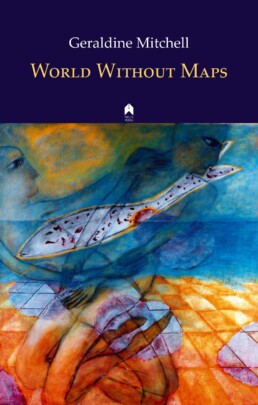
Geraldine Mitchell
World Without Maps
ISBN:
9781851320431 paperback
9781851321988 hardback
The threat of eruption is never far below the deceptively smooth surface of Geraldine Mitchell’s work. Like the phantom fish that swims ‘in blind elliptic orbit’ the poems can, at any moment, break water and ‘take a bite’. Mitchell’s debut, World Without Maps, builds on the poems which won the Patrick Kavanagh Award in 2008 and reflects a contemporary reality stripped of certainties where the very notion of home becomes elusive and we must grow accustomed to living ‘half in one place/half the other’ (‘Toll’).
‘Geraldine Mitchell writes with such sophistication and élan that it is difficult to think that this is a first collection. Her special gift is a description of the illusory veils of Maya that all our lives are made of again and again. This added to an extraordinary gift for image and metaphor which makes a weekend plane trip abroad ‘the well-worn arc of a patinated shuttle/plying back and forth to weave our lives/together. Darning holes’ (‘Flight Patterns’). Geraldine Mitchell is a very careful observer and listener. She always was: ‘But my eyes saw, my ears heard,/my nose picked up/the layered scent of adult talk’ (‘The Invisible Girl’). This manuscript is a distillation of all those years of picking up layered scents. It is a real find and a thoughtful read. It brims with possibilities’ − Nuala Ní Dhomhnaill
‘These are the poems of a considered and considering intelligence, surefooted, meditative and clear. One is in the presence of a clear-eyed sensibility that considers, but does not judge, human fallibility […] The language of these poems is succinct, the imagery crisp and the poet has the confidence to allow the images and rhythms to work their chemistry upon us without too much commentary. In the best of these poems we are left with an image which resonates and opens out into mystery – something which is at the core of the poetic’ − Moya Cannon and Theo Dorgan, Judges’ Report, The Patrick Kavanagh Award, 2008.
Red Riding Hood's Dilemma
Shortlisted for the Shine/Strong Poetry Award
In this debut collection Órfhlaith Foyle’s poetry is adventurous, mysterious and passionate. Her poems tell of migrant emotions as well as migrant journeys. There is death and the loss of faith, as well as celebration of the intense need human beings have for each another. She plays with rhyme and narrative techniques, delivering words into vivid poems that delineate the darkness of life and how such darkness has to exist within us despite what we fear from it. Órfhlaith Foyle writes poems the way a wanderer travels another country. She juxtaposes ideas and feelings with her truth and what she sees in the world around her. This collection demonstrates her love for art and words, and the need to be a witness to life.
Órfhlaith Foyle was born in Nigeria to Irish parents and is currently based in Galway. Her first novel, Belios, was published in 2005 by The Lilliput Press. A collection of her short fiction and poetry, Revenge, was published in 2005 by Arlen House, along with her debut short fiction collection, Somewhere in Minnesota, and her second collection, Clemency Browne Dreams of Gin. She is currently working on her third short fiction collection, her second poetry collection and a play.
Washing Windows?: Irish Women Write Irish Poetry
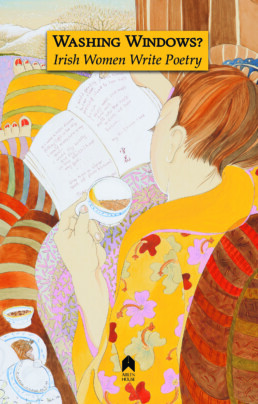
Alan Hayes (ed.)
Washing Windows?: Irish Women Write Irish Poetry
ISBN: 9781851321797
Contributors:
Edna O’Brien
Moya Cannon
Shirley McClure
Mary O’Malley
Celia de Fréine
Leanne O’Sullivan
Maeve Kelly
Ruth Carr
Martina Evans
Doireann Ní Ghríofa
Sinéad Gleeson
Mary O’Donnell
Joan McBreen
Mary Dorcey
Siobhán Campbell
Moyra Donaldson
Pauline Bewick
Éimear O’Connor
Katie Donovan
Jessica Traynor
Geraldine Mitchell
Dairena Ní Chinneide
Nessa O’Mahony
Jane Clarke
Ann Leahy
Órfhlaith Foyle
Eileen Casey
Anne Le Marquand Hartigan
Maureen Boyle
Kate Newmann
Geraldine Mills
Connie Roberts
Deirdre Brennan
Mary Rose Callaghan
Nuala Ní Chonchúir
Aoife Casby
Mary Montague
Sarah Clancy
Jo Slade
Mary Coll
Tanya Farrelly
Bríd Cummins
Annie Deppe
Paula Cunningham
Clemency Emmet
Carole Farnan
Clodagh Brennan Harvey
Anita Gracey
Erin Fornoff
Wilma Kenny
Jennifer Matthews
Susan Knight
Ellie Rose McKee
Suzie Fry
Peggie Gallagher
Mary Madec
Dani Gill
Geraldine Montague
Mary Guckian
Teri Murray
Aideen Henry
Maura Johnston
Phyl Herbert
Therese Kieran
Nell Regan
Joan Newmann
Christine Hammond
Máighréad Medbh
Micheline Egan
Emma Must
Úna Ní Cheallaigh
Aoibheann McCann
Liz O’Donoghue
Natasha Cuddington
Mamo McDonald
Lorna Shaughnessy
Mary Ryan
Sarah Padden
Vivienne McKechnie
Deirdre Shanahan
Colette Ní Ghallchóir
Maria McManus
Jane Robinson
Geraldine O’Kane
Lisa C. Taylor
Rosemarie Rowley
Colette Nic Aodha
Gráinne Tobin
Catherine Webb
Una O’Higgins O’Malley
Moya Roddy
Siofra O’Meara
Mary Ringland
Bridget Wallace
Lila Stuart
Jean Tuomey
Sarah Strong
Mary Turley-McGrath
Denise Nagle
Constantia Grierson
Mary Barber
Laetitia Pilkington
Eva Gore-Booth

